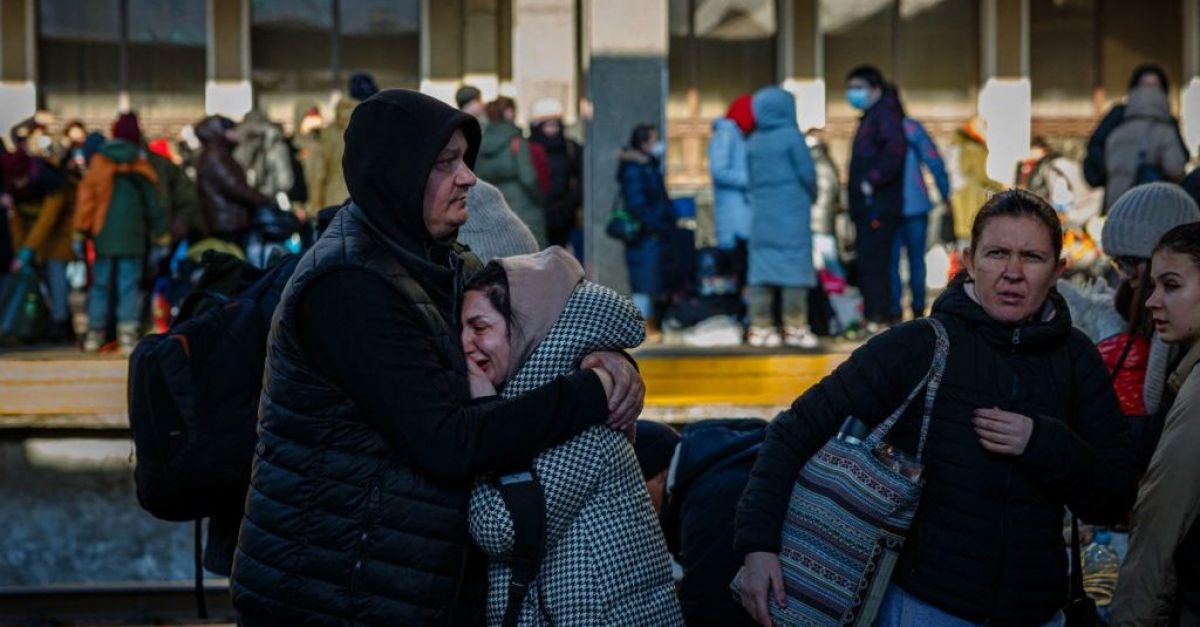
What you need to know right now
- Moscow faced increasing isolation on Tuesday as Russian president Vladimir Putin showed no sign of stopping an invasion of Ukraine, where fierce fighting and Russian bombardment have killed dozens and sparked a refugee crisis.
- A Russian armoured column bore down on Kyiv on Tuesday and invasion forces fired lethal rocket barrages into the centre of the country’s second-largest city, on the sixth day of Russia’s assault.
- A senior US defence official said Russia’s move on Kyiv has seemingly stalled on Tuesday afternoon, as its forces face logistics challenges.
- Russia said it was placing temporary curbs on foreigner investors seeking to exit Russian assets, as ripple effects of sanctions on Russia were making themselves felt.
- The 193-member UN General Assembly began meeting on the crisis ahead of a vote this week to isolate Russia.
- Talks on a ceasefire ended without a breakthrough.
- Mr Putin told France’s president Emmanuel Macron a Ukraine settlement was only possible if Kyiv was neutral, “denazified” and “demilitarised” and Russian control over annexed Crimea was formally recognised, the Kremlin said.
- Ukraine’s Western allies increased weapons transfers in support, and Britain called for such transfers to be expanded. Finland agreed to ship 2,500 assault rifles and 1,500 anti-tank weapons. Canada will supply anti-tank weapons and upgraded ammunition, prime minister Justin Trudeau said.
- Russia’s foreign ministry said those supplying lethal weapons to Ukraine will bear responsibility should they be used during Russia’s military campaign.
- The United Nations said more than 500,000 people had fled Ukraine to neighbouring countries since the start of Russia’s invasion.
- The United States expelled 12 Russian diplomats at the United Nations over national security concerns, US and Russian diplomats said.
- Airlines braced for potentially lengthy blockages of key east-west flight corridors after the EU and Moscow issued tit-for-tat airspace bans.
- Tánaiste Leo Varadkar has said Russia’s actions may cause Ireland to consider its tradition of military neutrality, adding the State is likely to get more involved in EU defence policy.
5.42pm: Russia’s invasion of Ukraine is an existential threat to peace in Europe, Polish prime minister Mateusz Morawiecki has said.
“Today we focus on the situation in Ukraine, because it is an existential threat to peace in Europe,” Mr Morawiecki said after a meeting with European Commission president Ursula von der Leyen in Brussels.
Meanwhile, Meta Platforms is globally demoting content from Russian state-controlled media outlets’ Facebook pages and Instagram accounts, as well as posts containing links to those outlets on Facebook, according to the company’s head of global affairs Nick Clegg.
Mr Clegg also said the company had seen a “definitely discernable” degradation of its services in Russia since the country’s authorities announced they would restrict Meta’s platforms in the country, adding there had been an effect particularly on video and other multimedia content.
Advertisement
5.33pm: Ukrainian president Volodymyr Zelenskiy said he spoke to US president Joe Biden on Tuesday about US leadership on sanctions against Russia and defence assistance to Ukraine as it battles Russian troops.
“We must stop the aggressor as soon as possible. Thank you for your support!,” Mr Zelenskiy said on Twitter.
Just had a conversation with @POTUS. The American leadership on anti-Russian sanctions and defense assistance to Ukraine was discussed. We must stop the aggressor as soon as possible. Thank you for your support!
— Володимир Зеленський (@ZelenskyyUa) March 1, 2022
A White House official confirmed the two presidents spoke on the phone for approximately 30 minutes.
5.17pm: The intelligence arm of the Ukrainian defence ministry said on Tuesday that Russia was preparing a provocation to justify the entry of Belarussian troops into the conflict.
In a post on social media, it said it had data showing there were about 300 Belarussian tanks in Belarus near the border with Ukraine.
‼️#DIUinforms?
Russia is preparing a deliberate provocation to justify the introduction of Belarusian troopsAccording to available data, there are now about 300 Belarusian tanks near the Belarusian-Ukrainian border pic.twitter.com/i4r1arorSE
— Defence intelligence of Ukraine (@DI_Ukraine) March 1, 2022
5pm: Turkish president Tayyip Erdogan on Tuesday called on Ukraine and Russia to immediately stop fighting and to “contribute to world peace”, adding Ankara was not opposed to Nato enlargement.
Advertisement
Nato member Turkey shares a maritime border with Ukraine and Russia and has good ties with both. Under a 1936 pact, Ankara on Monday said it was closing its Black Sea straits during Russia’s invasion of Ukraine, limiting the passage of some Russian ships from the Mediterranean.
Asked about Ukraine‘s bid for European Union membership at a news conference in Ankara, Mr Erdogan said Turkey, an EU candidate for decades, would support any enlargement of Nato and the EU.
Mr Erdogan called on the bloc to show the “same sensitivity” it showed for Kyiv’s membership bid for Turkey’s application, and slammed member states for being “not sincere”. “Will you put Turkey on your agenda when someone attacks (us) too?” he said.
4.45pm: Belarusian leader Alexander Lukashenko has said none of his country’s military units had moved from their bases, but that the country could mobilise in two to three days in the event of danger, the state-run Belta news agency reported.
Russia warned Kyiv residents to flee their homes on Tuesday and rained rockets down on Kharkiv, as Russian commanders who have failed to achieve a quick victory shifted tactics to intensify the bombardment of Ukrainian cities.
Meanwhile, the Ukrainian foreign ministry said Russia was barbaric for attacking a TV tower, near a memorial site that commemorates the victims of Babyn Yar, one of the biggest single massacres of Jews during the Nazi Holocaust.
Advertisement
Russian troops fired on the TV tower, near the Memorial complex #BabynYar.
Russian criminals do not stop at anything in their barbarism. Russia = barbarian. pic.twitter.com/MMJ6wSfpsS
— MFA of Ukraine ?? (@MFA_Ukraine) March 1, 2022
“Russian troops fired on the TV tower, near the Memorial complex #BabynYar,” it said on Twitter. “Russian criminals do not stop at anything in their barbarism. Russia = barbarian.”
The attack killed five people, according to the Ukrainian emergency services.
4.30pm: Russia’s military move on Kyiv has stalled as its forces face logistics challenges, including a shortage of food for some units, and appear to be re-evaluating how to move forward on the city, a senior US defence official said on Tuesday.
“One reason why things appear to be stalled north of Kyiv is that the Russians themselves are regrouping and rethinking and trying to adjust to the challenges that they’ve had,” the official said, speaking on the condition of anonymity.
4.10pm: Member states of the International Energy Agency (IEA) have agreed to release 60 million barrels of oil from storage, with half the volume coming from the United States, Japanese industry minister Koichi Hagiuda told reporters, adding members are ready to tap their oil reserves further if needed.
Advertisement
The extraordinary meeting of ministers belonging to the Paris-based agency aimed to cool oil prices which have shot above $104 (€93) a barrel in the wake of Russia’s invasion of Ukraine.
The share of each country in the agreed release was expected to be determined in the coming days, the minister added.
3.55pm: Belarusian leader Alexander Lukashenko said on Tuesday that he has asked Russia’s president Vladimir Putin to deploy an additional S-400 missile complex west of Minsk, the RIA news agency reported, citing another news agency, Belta.
The complex is needed to defend the territory of Belarus, Mr Lukashenko was quoted as saying.
However, a US official later stated there is no indication that Belarus is sending troops into Ukraine.
3.35pm: Russian forces have attacked a television tower in Ukraine‘s capital Kyiv, potentially disrupting its signal, Ukrainian interior ministry adviser Anton Herashchenko said on social media on Tuesday.
Work will be done to restore any lost signal, the local 1+1 television channel said.
3.20pm: British prime minister Boris Johnson has said British troops would not fight Russian forces in Ukraine, and that recent reinforcements were firmly within the borders of Nato members.
“These are nothing more than defensive measures, which have been the essence of Nato for more than 70 years,” he said during a visit to Estonia where Britain has deployed more troops.
Advertisement
“I want to be crystal clear finally, on that point, we will not fight Russian forces in Ukraine and our reinforcements like these reinforcements here in Tapa are firmly within the borders of Nato members and they are profoundly the right thing to do.”
3.05pm: US Secretary of State Anthony Blinken has told the UN Human Rights Council that Russian “crimes” in Ukraine are “mounting by the hour”, with strikes hitting hospitals, schools and residential buildings.
Mr Blinken, addressing the UN Human Rights Council in Geneva, said the forum’s urgent debate on Ukraine scheduled for Thursday, where a resolution brought by Kyiv and allies would set up an international probe into violations, is an “important step towards ensuring documentation and accountability”.
“We must send a resolute and unified message that President (Vladimir) Putin should unconditionally stop this,” he said.
? LIVE: Gathering in front of the @Europarl_EN in Brussels in support of #Ukraine ??.
Europe is with Ukrainians today. We will be with you tomorrow. We will not leave your side. https://t.co/1Oq8WQW4d1
— Roberta Metsola (@EP_President) March 1, 2022
2.55pm: Tánaiste Leo Varadkar has said Ireland is likely to reconsider its tradition of military neutrality in the wake of Russia’s invasion of Ukraine and may get more involved in common EU defence policy.
“This does require us to think about our security policy,” Mr Varadkar told RTÉ Radio. “I don’t see us applying to join Nato, but I do see us getting more involved in European defence.”
Before Russia’s invasion of Ukraine, a report commissioned by the Irish Government found the State was at risk of being left without a credible military capability to protect the State if it did not increase defence spending significantly.
2.30pm: The European Union must prepare for “millions” more refugees fleeing Russia’s invasion of Ukraine after more than 400,000 have passed into the bloc, EU Home Affairs Commissioner Ylva Johansson has said.
Speaking during a visit to Slovakia, Ms Johansson said she hoped the European Council would activate the temporary protection directive on Thursday giving protection to those fleeing, and added they were looking at deploying more people to help the EU country’s bordering Ukraine.
Meanwhile, Mexico’s president, Andres Manuel Lopez Obrador said on Tuesday that Mexico will not take any economic sanctions against Russia for invading Ukraine, and criticised alleged censorship of Russian state-sponsored media by social media companies.
2.15pm: Ukrainian president Volodymyr Zelenskiy said he had asked German chancellor Olaf Scholz to help close the skies over Ukraine to halt the shelling of civilians by Russia.
“Had a phone conversation with Chancellor Scholz. Spoke about Russia’s shelling of residential neighbourhoods in Ukrainian cities during peace talks. Emphasised the need to close the sky over Ukraine,” Mr Zelenskiy said.
He also told Mr Scholz to move swiftly on Ukraine’s EU membership bid.
Had a phone conversation with Chancellor @OlafScholz. Spoke about Russia’s shelling of residential neighborhoods in Ukrainian cities during peace talks. Emphasized the need to close the sky over ??. The work on Ukraine’s accession to the #EU needs to be accelerated.
— Володимир Зеленський (@ZelenskyyUa) March 1, 2022
1.20pm: Minister for Foreign Affairs Simon Coveney has said there is “indisputable evidence” of Russian war crimes in Ukraine as he raised the possible need for Irish families to host refugees escaping the conflict.
Simon Coveney said Ireland would be “central” to the humanitarian response to the crisis but said there was unlikely to be enough state-provided accommodation in the country to cope with a potential influx of 20,000 Ukrainians.
12.50pm: A senior Russian official has launched a new stark warning over its sanctions against his country for its war in Ukraine.
Dmitry Medvedev, a deputy head of Russia’s Security Council, was retorting to a comment by French finance minister Bruno Le Maire on Tuesday that the European Union was going to unleash an all-out economic and financial war against Russia.
“Today, some French minister has said that they declared an economic war on Russia,” said Mr Medvedev, who served as placeholder president in 2008-2012 when Vladimir Putin had to shift into the prime minister’s post because of term limits.
“Watch your tongue, gentlemen! And don’t forget that in human history, economic wars quite often turned into real ones,” Mr Medvedev said on Twitter.
12.45pm: The trustees of the Chelsea Foundation made a serious incident report to the Charity Commission after Blues owner Roman Abramovich announced his intention to place stewardship of the club in their hands.
The Charity Commission has confirmed receipt of the report, and is seeking further information from the trustees following Saturday night’s announcement.
It is understood the Foundation’s six trustees held a meeting on Sunday and are seeking legal clarity and advice from the Commission over how, and whether, the Russian billionaire’s proposal can be enacted.
12.20pm: A Ukrainian team in Ireland are aiding their embattled country by developing interactive maps with real-time information for emergency services across Ukraine.
The team of five are constantly updating the maps with data on services such as blood centre locations, metro shelters and emergency trains to evacuate older people and children from the country.
12.15pm: Boris Johnson has been confronted by a Ukrainian woman who emotionally demanded Britain and Nato allies enforce a no-fly zone over her country to protect people from Russia’s bombs.
Daria Kaleniuk became tearful as she told the British prime minister at a press conference in Warsaw, Poland, on Tuesday that he must do more to protect civilians from Vladimir Putin’s air strikes.
11.45am: The UN refugee agency says that about 660,000 people have fled Ukraine for neighbouring countries since the Russian invasion began.
The number, given on Tuesday, was up from a count of more than 500,000 a day earlier.
Shabia Mantoo, a spokeswoman for the UN High Commissioner for Refugees, said in Geneva that “at this rate, the situation looks set to become Europe’s largest refugee crisis this century”.
Diplomats walked out while Russia’s foreign minister Sergei Lavrov (on screen) addressed a conference on disarmament on Tuesday. Photo Getty Images
11.20am: The Kremlin has denied that the Russian military has used cluster munitions in Ukraine and insisted that the Russian forces only have struck military targets.
Kremlin’s spokesman Dmitry Peskov insisted that “the Russian troops don’t conduct any strikes against civilian infrastructure and residential areas”.
Mr Peskov’s claim contradicts abundant evidence documented of indiscriminate shelling of homes, schools, and hospitals across Ukraine.
11am: The separatist forces in Donetsk say they have established two corridors for the evacuation of civilians from Mariupol, an indication that a large attack on the key Azov Sea port could be imminent.
Eduard Basurin, a spokesman for the separatists’ military, said civilian safety of movement is guaranteed until Wednesday in the corridors.
10.20am: Russian shelling has again pounded civilian targets in Ukraine’s second-largest city and a 65km convoy of tanks and other military vehicles threatened the capital.
9:20am: A huge Russian armoured column bore down on Kyiv on Tuesday, after the lethal shelling of civilian areas in Ukraine’s second largest city raised fears that frustrated Russian commanders could resort to more devastating tactics.
Nearly a week since after Moscow launched war on its neighbour it has failed to capture a single major Ukrainian city after running into unexpectedly fierce resistance.
Western countries fear that Russian commanders could now unleash the tactics they employed in Syria and Chechnya in recent decades, when they pulverised civilian areas, killing thousands, as they sent in their tanks.
8.20am: Kharkiv region head Oleg Synegubov said on Tuesday that Russian missile attacks hit the centre of Ukraine’s second-largest city, including residential areas and the regional administration building, as Moscow started day six of its invasion.
Synegubov said Russia launched GRAD and cruise missiles on Kharkiv but that the city defence was holding.
“Such attacks are genocide of the Ukrainian people, a war crime against the civilian population!” he said.
7.30am: A Russian military convoy threatening Kyiv is far bigger than initially thought, with satellite images showing it occupying much of a 65km stretch of road north of the Ukrainian capital.
It comes as more than 70 Ukrainian soldiers were killed after Russian artillery hit a military base in Okhtyrka, a city between Kharkiv and Kyiv, according to a post by the head of the region Dmytro Zhyvytsky on Telegram.
And explosions and gunfire were heard in embattled cities in eastern Ukraine as Russia’s invasion met unexpectedly stiff resistance. The Russian military assault on Ukraine was in its fifth day on Monday.











